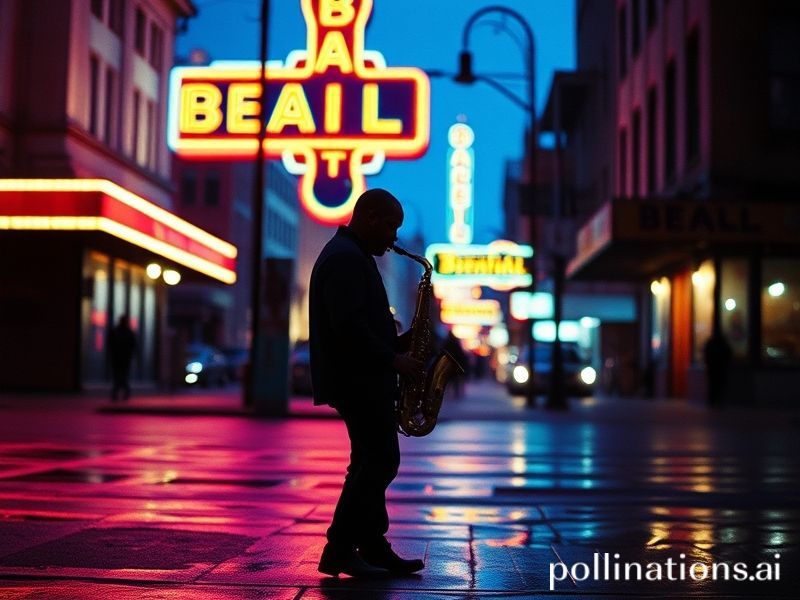Memphis: The World’s Supply-Chain Blues Capital Where Globalization Sings for Tips
Memphis, Tennessee, is having a moment, and the planet is watching with the same expression your aunt uses when she learns you’ve taken up taxidermy: equal parts fascination and pity. From Berlin techno clubs sampling Three 6 Mafia at 3 a.m. to Singaporean analysts Googling “FedEx hub throughput,” the river city once famous for mud and murder ballads has become a Rorschach test for whatever the rest of us are anxious about this week. In short, Memphis is no longer merely the buckle on the Bible Belt; it’s the loose rivet the whole globalized trouser leg is waiting to see if it can hold.
Consider the supply-chain theologians who now speak of Memphis the way medieval peasants murmured about Constantinople: a mythical chokepoint where the world’s gizmos either flow or don’t. FedEx’s “SuperHub” out by the airport processes more tonnage per night than most nations move in a month. When Chinese microchips, Bavarian car parts, and that regrettable impulse-buy inflatable flamingo converge on one 3,900-acre patch of Tennessee asphalt, the Mercator projection warps. If Memphis sneezes, every just-in-time economy on earth catches whatever variant of delay anxiety is trending. Analysts in Brussels now keep weather tabs on the Mississippi as obsessively as they once monitored the Fulda Gap; a single April thunderstorm can make a Dutch bicycle shop miss its quarterly numbers. Globalization, it turns out, is less “flat world” and more “fragile pizza slice balanced on a blues riff.”
Meanwhile, Memphis’s cultural exports continue to colonize earbuds from Lagos to Lima, usually without credit or royalty checks. Japanese teens wearing vintage Stax T-shirts perform TikTok dances to samples of samples, while French philosophers write impenetrable essays arguing that crunk is the last authentic proletarian scream. The city’s sonic DNA—equal parts cotton-field lament and cash-register ka-ching—has become the elevator music for late capitalism. Nobody asked the ghost of Howlin’ Wolf if he wanted to soundtrack an NFT drop, but intellectual-property law has always been a polite euphemism for armed robbery with better paperwork.
On the geopolitical chessboard, Memphis is also the square where America’s domestic contradictions go to chain-smoke. European journalists parachute in for stories on gun violence, then file 1,200-word meditations on “the American dilemma” while sipping artisanal espresso in Overton Square. Chinese trade delegations tour Graceland like pilgrims, snapping selfies with a jumpsuited Elvis impersonator who earns more than a Shenzhen iPhone assembler. Both visitors leave convinced their own systems are superior, which is exactly how declining empires prefer their self-delivering propaganda.
The city’s latest act of accidental global relevance is its experiment in post-austerity urbanism: a $200 million riverside makeover designed to lure remote-work refugees fleeing San Francisco rents and existential dread. City boosters brand it “the next Austin, but with soul,” which locals translate as “brace for kombucha colonization.” Already, Berlin digital-nomad forums feature threads titled “Memphis: still cheap, still dangerous?” The answer, like most things on the internet, is “depends on your melanin and Wi-Fi password.”
And yet, for all the spreadsheets and streaming analytics, Memphis remains stubbornly analog. The same humidity that grounds cargo jets also warps the very concept of haste; time here still drips like molasses, or felony cases. Outsiders arrive expecting a theme park and find instead a city negotiating the going rate for redemption, one pawnshop saxophone at a time. If that sounds romantic, congratulations—you’ve never sweated through a July night with only a box fan and the blues for company.
In the end, the world keeps Memphis on retainer as both cautionary tale and cheap rehearsal space. When the algorithms finally eat themselves and the oceans rise to claim FedEx Runway 18R, historians will note that the last FedEx scan before the lights went out read: “Memphis hub—exception weather.” Humanity will nod, unsurprised. After all, we always knew the end would arrive delayed, probably by a thunderstorm, and definitely without a refund.







